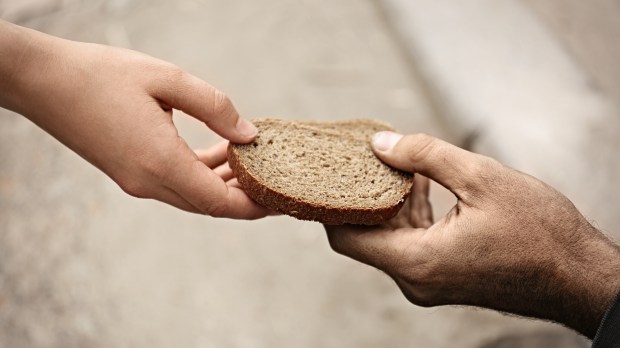Lenten Campaign 2025
This content is free of charge, as are all our articles.
Support us with a donation that is tax-deductible and enable us to continue to reach millions of readers.
Can the multiplication of loaves and fishes be scientifically explained? Or is today’s Gospel really a miracle? For some modern minds, this passage is an obstacle, one requiring study and interpretation.
Some have tried to altogether sanitize this passage, explaining it as “a miracle of sharing.” German philosophical rationalists Heinrich Paulus and Albert Schweitzer are among those interpreters who advanced the idea that nothing supernatural happened in John 6. Rather than believe that Christ performed an extraordinary feat, these and other demythologizers argue that the crowd that gathered to hear Jesus simply shared their resources.
Problems with scrapping the miracle
The first problem with the rationalist account is: that’s not the apparent meaning of the text. The Gospels report no availability of food, such that it would cost 200 days’ wages to purchase. The mere five loaves and two fish are miraculously multiplied to provide for the assembly. They weren’t a little short … there was no food.
But there is a greater problem lurking in the rationalist interpretation. If we begin to remove the supernatural from Christ, at what point do we stop accepting the transcendent altogether? Are we going to begin to reject the miraculous healings? What about the Lord’s conception? The very fact of his rising from the dead?
Christianity is the constant call to embrace the transcendent. Not to be superstitious or naive. Christians shouldn’t shy away from the wonders of the Lord’s life. After all, we believe that there is much more to this life than we see and that it doesn’t end in death…
Three lessons about God
So what does this miracle teach us? How does the action of today’s Gospel lead our hearts and minds to God?
- God provides. In union with his Heavenly Father—to whom he offered prayers of thanksgiving—Christ displays his divine power in this exercise of goodness. It is precisely insofar as he pours forth a share of divine goodness, caring for those beloved by God in need, that his divine power is able to be recognized.
Christ is good. We need to be reminded of his goodness. In his merciful, divine act of multiplying loaves and fish, he shows us his goodness. It makes us think of the Providence of God, which nourished and sustained Israel in the journey through the desert.
- Without Christ, the apostles are not able to provide for the needs of the people. Diligent and well-intentioned, the disciples find themselves in a panic, because they recognize that they have not the means to care for the assembled crowd.
No Christian, by his or her own competence, his or her own strength, is able to satisfy all the physical needs of the world. To say nothing of man’s spiritual needs! Even the holiest of prophets, like Moses or Elijah, worked miracles not by the authority of their own person, but through the power of God.
God alone is master of creation. God alone works miracles. And God alone fulfills the needs and longings of our hearts.
- And yet, God chooses to use men as the instruments of his providence. The apostles, the stewards of the Gospel, pour forth their entire lives in service to Jesus’ mission. In imitation of their master, tradition tells us, they died as martyrs (well, all except John, anyway).
These imperfect men were called by God in order that God might show forth his power. Down through the ages, in unbroken succession from the apostles, heirs of this mission (the priests and bishops of today), devote their lives however imperfectly to this showing forth of the power of God. Were they perfect, who knows, maybe we would be tempted to idolize them, believing them to be Gods! What we do know, is that God, according to his wisdom, has arranged it so.
Every Christian offers up the meager loaves and fishes of their life, looking to Christ to transform it. God will take the simple gifts, which first came from him, and raise them up, allowing them to redound to his glory. Just like Christ takes the elements of the natural world and uses them to speak to his divinity and power, the Christian knows that the mundane, the simple can, by God’s grace, be transformed into the transcendent.
And so God reveals himself to us in the miracle of the multiplication of loaves and fish. God is provident and good. God alone fulfills our needs, physical and spiritual. And God chooses to use imperfect ministers as instruments of his labor.
And he gives us more still. As Catholics, we know that there is a greater gift we are given. The Eucharist, the Bread of Life, the food of angels, sustains on our pilgrimage on this side of eternity. We hunger. We desire. We encounter time and again our limitation and finitude.
And yet God deigns to give us, under the guise of mere bread, his very self.

